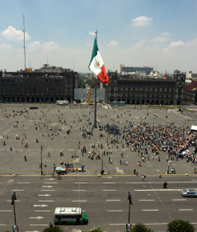Mexican Supreme Court Expected to Uphold Liberal Abortion Law
 (NEW YORK – C-FAM) An important legal decision by the Mexican Supreme Court on the Mexico City abortion law is expected any day. Close observers expect the liberal abortion law passed last year by Mexico City's legislature to be upheld.
(NEW YORK – C-FAM) An important legal decision by the Mexican Supreme Court on the Mexico City abortion law is expected any day. Close observers expect the liberal abortion law passed last year by Mexico City's legislature to be upheld.
The Federal District’s Legislative Assembly passed a law in April 2007 redefining abortion as “the interruption of pregnancy after the twelfth week of gestation.” The district’s penal code had previously defined abortion as the “death of the product of conception at any time during pregnancy.” Since the change, over 12,000 chemical and surgical abortions are estimated to have occurred in Mexico City.
Mexico’s Attorney General, Eduardo Medina Mora-Icaza, brought a suit directly to the Supreme Court seeking to overturn the law in May 2007. At the same time, the president of the National Human Rights Commission began a parallel challenge. The Court consolidated the two actions.
Beyond attacking the constitutionality of the law, the Attorney General claimed that the Legislative Assembly for the Federal District – which is distinct from states under Mexico’s federalist system of government – could not legislate on issues of public health. The Court appears likely to reject this argument.
The legal argument with more far-reaching implications, however, is one that both pro- and anti-abortion sides have appealed to: the effect that international treaties incorporated into Mexico’s internal law have on abortion legislation.
Pro-lifers allege that the liberalized law violates international treaties such as the American Convention on Human Rights, otherwise known as the “San Jose Pact,” which specifically states that legal protection of the right to life should exist “in general, from the moment of conception.”
Lawyers for the Center for Reproductive Rights and the International Commission of Jurists countered with a formal third party intervention arguing that the court should uphold the law, based in part on reading the same treaties as mandating a right to abortion. Such arguments rest principally on interpretations made by various treaty monitoring bodies charged with overseeing treaty implementation, rather than the text of the treaties themselves. Amnesty International also submitted a short memorandum echoing this position.
Earlier this month the International Organizations Law Group – the public interest law arm of the Catholic Family and Human Rights Institute (C-FAM) – circulated an informal legal memorandum among the Supreme Court justices. The memorandum pointed out that the text of no international treaty requires states to decriminalize abortion. Rather, they are consistent with protection of unborn human life, regardless of interpretations suggested by unelected and unaccountable treaty bodies having no authority to rewrite the domestic legislation of sovereign states.
In order for the Mexico City law to be overturned, at least 8 of the 11 jurists hearing the case would have to vote against it. While one judge has already found the law unconstitutional, the Associated Press is reporting that as many as seven judges signaled during deliberations this week that they would uphold it.
Pro-lifers have said they would seek a referendum to undo the legislation. Wenceslao Renovales, a Mexican attorney who has followed the case closely, told the Friday Fax that legal obstacles foreclose that possibility.
View online at: https://c-fam.org/friday_fax/mexican-supreme-court-expected-to-uphold-liberal-abortion-law-2/
© 2025 C-Fam (Center for Family & Human Rights).
Permission granted for unlimited use. Credit required.
www.c-fam.org









